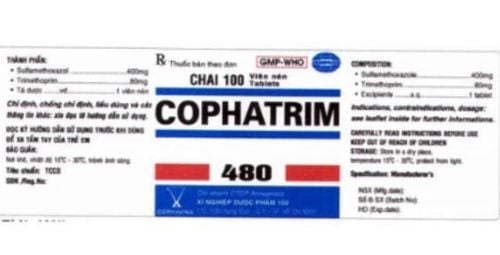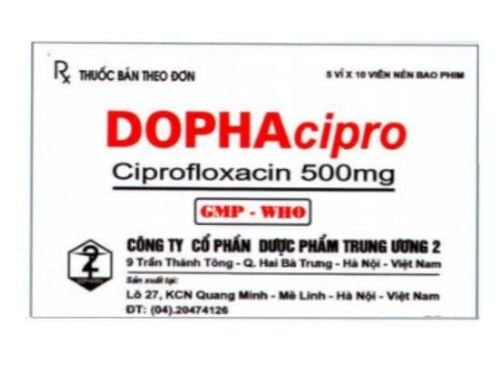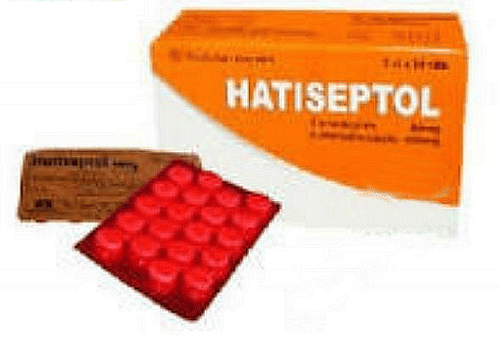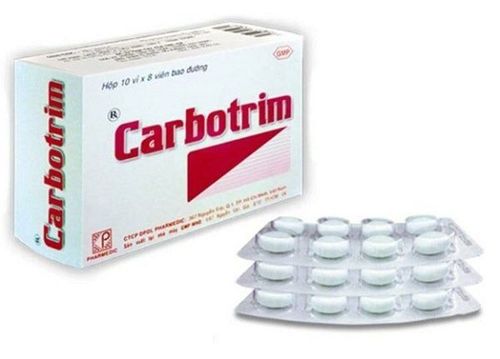This is an automatically translated article.
Mebisulfatrim is a combination antibiotic with a broad spectrum of activity against many strains of Gram-negative and Gram-positive bacteria. So what are the uses of the drug and what are the points to note to use it effectively?1. What is Mebisulfatrim?
Mebisulfatrim has main ingredients including Sulfamethoxazole and Trimethoprim. Ingredients Sulfamethoxazole - is a lipid-soluble sulfonamide, which inhibits bacterial growth by inhibiting the production of bacterial dihydrofolic acid. Ingredients Trimethoprim - is a diaminopyrimidine with bacteriostatic or bactericidal action depending on the growth environment of the bacteria. The mechanism of action of the drug is to inhibit the enzyme dihydrofolate-reductase, preventing the conversion of bacterial dihydrofolic acid into tetrahydrofolic acid, thereby preventing bacterial DNA synthesis. The combination of both components Sulfamethoxazole and Trimethoprim in Mebisulfatrim creates a 2-step inhibition in the bacterial metabolism of folic acid, increasing the antibacterial effect. The synergistic mechanism when combined also prevents the growth of bacteria resistant to each drug component. Mebisulfatrim is sensitive to many strains of Gram-negative and Gram-positive bacteria such as Staphylococcus aureus, S. Pneumoniae, Staphylococcus saprophyticus, Streptococcus pyogenes, Haemophilus influenzae, Klebsiella oxytoca, Moraxella catarrhalis, E. coli, Morganella morganii,... Absorbents rapidly orally, 50% bound to plasma proteins, reaching peak plasma concentrations after 1 - 4 hours. The drug crosses the placenta, the blood-brain barrier and breast milk. Finally excreted in the feces unchanged.
2. Indications of Mebisulfatrim
Mebisulfatrim is indicated for the treatment of the following infections:
Uncomplicated gonococcal infections. Acute and chronic urinary tract infections. Pneumonia caused by the bacterium Pneumocystis carinii. Infectious diseases of the upper and lower respiratory tract: Bronchitis, cheek sinusitis, pharyngitis, otitis media,... Bacillary dysentery.
3. Contraindications of Mebisulfatrim
Mebisulfatrim should not be used in the following cases
Allergy to Sulfonamide, Trimethoprim or any other ingredient of the drug. Patients with moderate to severe hepatic and renal impairment. The drug crosses the placenta and affects the development of the fetus, so pregnant women, especially the first 3 months of pregnancy, should not use drugs. Patients with megaloblastic anemia due to folic acid deficiency, thrombocytopenia, acute porphyria. Children under 2 months of age are not indicated for the use of Mebisulfatrim. Note when using Mebisulfatrim
The elderly, patients with impaired renal function, patients with impaired liver function, blood cell disorders should be carefully monitored during the course of taking the drug. The drug passes into breast milk and has not been studied for safety in children, so women who are breastfeeding should consider taking the drug. Patients infected with HIV when taking the drug may increase the incidence of side effects such as skin reactions, fever, hematological disorders. Patients with folate deficiency require careful monitoring because of the increased risk of hematologic disorders with prolonged high doses of Mebisulfatrim.
4. Mebisulfatrim drug interactions
Co-administration of Mebisulfatrim with diuretics (especially thiazides), Digoxin, Cyclosporin increases the risk of thrombocytopenia, increased nephrotoxicity in the elderly. Mebisulfatrim reduces elimination, increases the effect of methotrexate, Indomethacin when used together. Combination with Pyrimethamine increases the risk of megaloblastic anemia. Mebisulfatrim prolongs prothrombin time when used with Warfarin, reducing the effectiveness of tricyclic antidepressants, oral contraceptives. The drugs Amantadine, Zidovudine, Azathioprine, Rifampicin, Procainamide when co-administered with Mebisulfatrim can increase plasma concentrations of both, thereby increasing the risk of cytotoxicity.
5. Dosage and usage
How to use :
Mebisulfatrim is in the form of hard capsules. Drink directly with water, avoid crushing or breaking the tablet. Use the drug continuously for 5 - 10 days as prescribed by the doctor. Dosage:
Urinary tract infections: Take 1-2 tablets (480mg)/time x 2 times a day. Respiratory tract infections: Take 1-2 tablets (480mg)/time, 2-3 times a day. Bacillary dysentery: Take 1-2 tablets (480mg)/time x 2 times a day.
6. Side effects of Mebisulfatrim
Some unwanted effects may be encountered when taking Mebisulfatrim medicine
Common side effects: Fever. Nausea, vomiting, diarrhea. Itching, rash. Tongue inflammation. Uncommon side effects Eosinophilia, neutropenia. Purpura, urticaria. Increase liver enzymes. Rare side effect Tinnitus. Erythema variety. Stevens-Johnson syndrome. Lyell's syndrome. Hemolytic anemia. Anaphylactic reaction. Meningitis. In summary, Mebisulfatrim is a broad-spectrum antibiotic, which is mandatory prescribed by doctors in infectious diseases of the respiratory tract, digestive tract, genitals,... The drug causes many side effects. desired for the body when misused, so do not abuse the drug when it is not needed.













